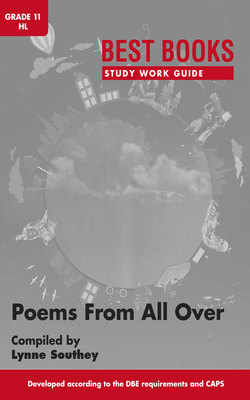Читать книгу Best Books Study Work Guide: Poems From All Over Gr 11 HL - Lynne Southey - Страница 15
На сайте Литреса книга снята с продажи.
We Wear the Mask by Paul Laurence Dunbar
Оглавление(See p. 22 in Poems From All Over)
| Title: | The “we” associates the speaker with his people, who all hide their true feelings behind a mask of contentment. The title is the first line and refrain of the poem. |
| Theme: | Suffering, endurance under oppression. |
| Mood: | Sad |
Discussion
We know that the poet is the child of slaves and African American, and we know how black people were treated in the United States of America at the time. This background knowledge lets us interpret the poem in a certain way.
The speaker speaks for his people, the oppressed descendants of the slave population. The face these people present to the world hides their suffering and unhappiness. They fear that to show their true feelings would cause more punishment to be inflicted on them. They pretend (“[T]his debt we pay to human guile”) to be happy. He continues by describing what it is they are hiding behind their masks: their suffering. They cry out to Christ (Christian beliefs) in their pain, but do not show it to the world.
The idea in the poem can also be generalised to all who suffer and hide their suffering. This could apply to all oppressed people and even to individuals.
The poem has three stanzas of uneven length (stanza 1 – five lines, stanza 2 – four lines and stanza 3 – six lines), with the rhythm and repetition typical of a song. There is rhyme but it is not regular. This supports the meaning of the poem: it seems a song, but is not, just as the people seem happy, but are not.
Analysis
| Stanza | Comment | |
| 1 | The masks (the false faces) that the “we” of the poem show, hide their faces (cheeks and eyes). They present a face of happiness. Their true feelings are expressed in “With torn and bleeding hearts”, indicating their deep suffering. The word “mouth” means their words when they speak. These are also lies, spoken in many ways (with “myriad subtleties”). The speaker is saying they have to hide the truth of their feelings and act as if they are happy. He doesn’t give a reason for this but it is understood that it is necessary for them to continue living without further harm or punishment. | The speaker speaks in a straightforward manner, making his meaning clear. The grin is the mask, the lie. The truth is the “torn and bleeding hearts”. This image gives an intense picture if we imagine it literally.(“[B]leeding heart” has come to mean something different today: someone with a bleeding heart feels something on behalf of someone else, often excessively.) |
| 2 | The second stanza contains a question, a rhetorical question that needs no answer. He asks why they would reveal the true state of how they feelings.The “world” is linked with “them”, pointing to an “us” and “them” opposition, the oppressed and the oppressors. He affirms that the “we” will only show “them” the mask. | Notice the rhyming first two lines: “wise / sighs” which is the same rhyme as in the first and third stanzas (“lies / eyes” and “cries / arise”). These sounds connect the ideas in the three stanzas, which are also basically the same, and at the same time add to the lyrical quality of a song. And then the refrain confirms this quality.Note “over-wise” not just “wise”. The word implies to know more than you need to. |
| 3 | “We smile” is repeated as in line 4 and opposed with “cries” at the end of the line. The smile has come to stand for the mask, the falseness of what they show. The cry to Christ is heart-rending, the idea of their suffering made worse with the words “tortured souls”. They walk a long distance, figuratively (not literally) but the “clay” under their feet is “vile”. | This stanza adds their cries to heaven as further evidence of their torture and suffering.The slaves in real life did sing, what we know today as “Negro spirituals”.Clay in its figurative sense usually means something not solid, as in “feet of clay”, not being built on real worth. Here he may mean that the path they have to tread, their lives, is “vile”, evil, bad. |
Contextual questions
1.Identify the alliteration in the first stanza and explain how it adds to the meaning. (2)
2.What reasons can the people in the poem have for not wanting the “they” to know their true feelings, do you think? (3)
3.Your anthology gives the meaning of “guile” (line 3) as cunning, slyness, cleverness at tricking people. In what way can the mask be seen in this negative light? (3)
4.How does the speaker’s use of the word “dream” in the second-last line add to the meaning being expressed? (3)
5.In what way do you see a similarity between the “we” of the poem and the situation in South Africa until the late 1990s? (4)
(15)
| Enrichment activity•Research what life was like for African Americans at the time.•Research the freedom movement of people such as Martin Luther King in the USA.•Research the punishment that was inflicted on African Americans by, for example, the Ku Klux Klan. |
